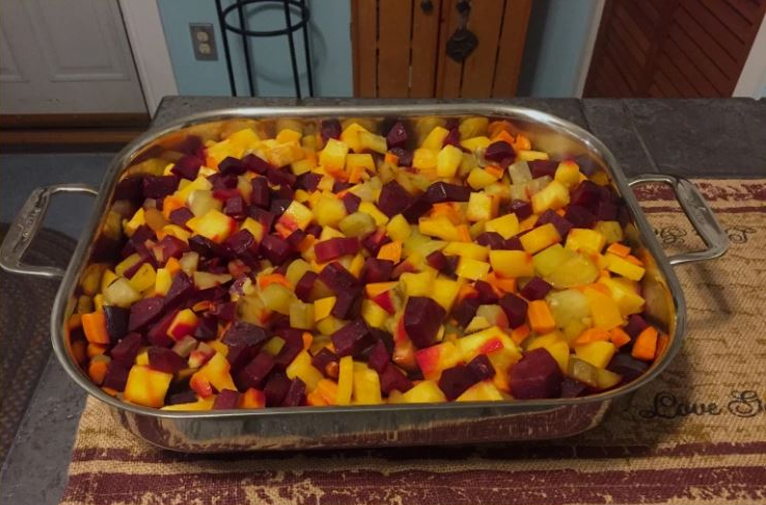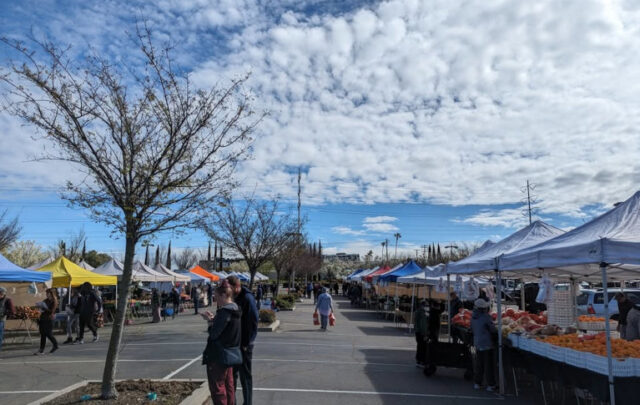So here’s an embarrassment… I may have missed blueberry season. Either that or it just didn’t happen much this year in New England. My bushes are still far too young to produce, though there were a few small berries on each plant. At about the same time my bushes were making berries, there were local berries for sale at the co-op. I have seen none at the farmers’ market this year. My former employers at the garden center are selling berries in plastic bins, so they’re not buying the fruit from their normal local suppliers who all use cardboard crates. (The state of Vermont gets all frowny about plastic packaging on locally produced stuff.) And aside from that one week at the co-op — which netted me exactly two quart bags in the freezer — I have seen no further berries there.
I suppose I shall have to go foraging this weekend. There are several pick-your-own farms in the area. Maybe one still has fruit. I hope so. I haven’t even had one bowl of oatmeal with fresh berries this year. Never mind muffins, scones, blueberry zucchini bread and whatever else strikes my fancy — that is, when it is moved beyond “stuff berries in mouth”.
I didn’t get to go looking for berries last weekend because I was working on Saturday, and then Sunday was spent on the August round of cutting down the brush as well as cleaning up the garden. There was much tying up of cucurbits. But not much in the way of tomatoes. Which is also not going well in the rest of Vermont. Nobody I know has fruit. Most people don’t even have flowers on their plants yet. Several have given up and ripped out the measly vines to put in autumn veg. I haven’t done that only because I don’t need that space. I interplanted the tomatoes with the asparagus, so that whole bed can just be useless until frost kills what manages to grow.
I did have to make an improv trellis. This is one of those things that always seems to happen. This year it was a bush slicing cucumber seed that turned out to be decidedly spiny and vine-y. But it’s always some story of something that unexpectedly needs support. This is one of the many reasons that I keep a motley selection of wood stakes and various small, straight branches and canes, along with a large quantity of twine. I keep these raggedy sticks in a barrel in the garage. It is not an attractive pile, being cracked and weathered and draped in old twine and bean vines. But by this point in the growing season the barrel is almost always empty, as it is now. I know there are gardeners who buy fancy metal supports, and there are probably quite a few more who spend money on cane from the garden center every year. I have a few metal tripods, and I’ve been known to build permanent trellis, but more often than not, this is a job for the random pile of potentially useful stuff that lives in my storage spaces. I consider this another kind of foraging, digging through the bins and tubs to find just that one thing that I absolutely need Right Now. Most gardeners I know do not have these bins — but nearly all the farmers do. I’m starting to think this might be the defining line between the two. (I tend to stand astride…)
While the tomatoes are not doing much and berry season may have been short this year, my garden is not short on produce. It may even be more than I can manage, though I’m keeping up so far. There is a tub of refrigerator pickled cucumber and onions that is being replenished every week. (Yes, I am getting a little tired of it…) I pulled out several pounds of shallots which are now curing. I think they have to be used more quickly than the other alliums, so there will be quiche and crepe for the next many weekend brunches.
The summer squashes are doing their thing. The yellow crookneck is almost as productive as the zucchini. Both have gone into my standard summer green chile succotash, and there is a nice basal layer of zucchini bread in the freezer now with more to be baked as soon as I replenish the egg supply.
I pulled the first of the rutabagas, carrots and beets. With maybe a tenth of the bed harvested, I was able to roast and freeze veg for at least two hearty rounds of winter stew, each pot of which can last me a week. So that’s something like half a month of dinner. And there’s much more left to be pulled out of the garden. I suspect there will be pickled beets and carrot cake before this bed is exhausted. And I’ve already started to sow the round of fall roots and greens.

A large pan of roots roasted with ginger and garlic — ready for the stew pot
My winter squash are taking over the hügelkultur mound. I already have a few nearly ripe mini-pumpkins and several fist-sized fruits on other vines. But most are just flowering, which is where they should be in August. I should have plenty for storing and still be able to give away carving pumpkins and gourds to my neighbors — in my first season! Squarely a success!
There is an old tradition that is fairly widespread in England and exists in patches in New England. In early August, harvested grain and hay fields are opened up to common pasturage and gleaning. Called Lammas meadows, these plots of private property are turned over to commoning for the harvest season to fatten up the family milk cows, to cut thatch, and to gather whatever was missed by the harvesters. It used to be an occasion for a couple solid weeks of community work and celebration in the fields. These days it’s just an echo, a party without the reason.
I think I’d like to turn my veg garden into a Lammas meadow. Maybe without the cows and the thatch. But I’d like to be able to take what I need out of the garden and then, rather than fretting over all the veg that will go to waste because I can’t eat it or store it, just open it up to the neighborhood. I am trying to work up the courage to trust that people will forage considerately. I think most of the people who would come into the garden space and root around for food are probably conscientious enough to not wreak havoc… but I still worry. I suppose it’s a bit like a “little library”, and those seem to be managed well enough. Only I do not want anything dropped in return. (Please take the cucumbers and go!) And it’s hard to kill a little library… but not at all difficult to mangle the squash vines… so yes, I worry. I’m curious if any of you have tried anything like that. I suspect that this might be how most of us with diminishing households and gardening obsessions will manage the surplus. But I think I might first like to hear from an early adapter with a success story.
©Elizabeth Anker 2022





